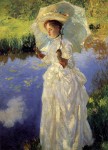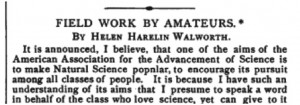
An 1880s woman. (Morning Walk, John Singer Sargent)
Whew! A gem of an article was published in Science magazine… in October 1880 that is. I stand by my previous assertion – reading some of the least current scientific papers available provides an entertaining and enlightening break from the confines of 2010.
A ~2500 word essay entitled “Field Work by Amateurs” covers some heavy topics bridging science and society in 1880 – topics that are still at the forefront of discussion today. Author Walworth comments on (a) the attitude of the layperson toward science, (b) what makes science boring and what makes it fun, and (c) almost out of nowhere, an urgent if slightly sexist plea for women to make an effort to learn about science.
According to Walworth, the value of every person having some basic education in science cannot be overestimated. There is no sense in me trying to paraphrase here; it’s put so eloquently:
“A mere elementary knowledge of any natural science is a proposition from which reason starts; it is a foundation on which thought builds, and a height from which imagination takes its flight. It is an education in all other knowledge, because it demands attention, observation and accuracy with well-defined expression.”
Most of the rest of the article discusses how amateur science clubs can be organized and encouraged, noting that science is boring/tedious when it is merely theoretical, but highly intriguing when it takes the form of “field work”. Then out of the blue, Walworth proclaims that it is “a deplorable fact that few women possessing [scientific] knowledge can be found”. Keep in mind, this is the 1880s – women basically just had babies back then. So props to Walworth for being an advocate of women’s education… but then it starts getting a little awkward:
“…scientific training is, of all others, that which women need to correct the defects which, as a class, they display–defects which have become inherent through continuous superficial training….Where they are now weak, both physically and mentally, they will become vigorous and strong; where they are complaining and sentimental, they will grow cheerful and wise…”
(It goes on for a bit in this same tone.) So, OK, at least Walworth believes these “defects” are due to environment, not some undeniable inferiority of women. Considering the sexism of the times, we’ll let this criticism slide. Nevertheless, it seems like quite a condescending attitude to not even conjecture that women could contribute to scientific progress – only that science would “improve” the woman.
 And that is where it got really interesting for me, because I thumbed back to look at the title page again and realized that Walworth is a woman! Helen Harelin Walworth. The article’s tone can’t then be condescending toward women… so what is it?
And that is where it got really interesting for me, because I thumbed back to look at the title page again and realized that Walworth is a woman! Helen Harelin Walworth. The article’s tone can’t then be condescending toward women… so what is it?
One hundred years after the publication of this article, a piece was published in Isis called “‘Women’s Work’ in Science: 1880–1910.” This historical overview gives some insight into what was up with Helen Walworth’s attitude. Apparently in 1880, the movement to give women higher education was just beginning to get in swing. The prevalent attitude of the time was that women seeking education were simply looking for personal fulfillment and hoping to somehow become better wives and mothers from the experience. This wasn’t an idea merely propagated by men. A well-educated female astronomer named Mary Whitney wrote an article in 1882 called “Scientific Study and Work for Women”, in which she concluded that in any case, scientific training would make women excellent mothers. It seems that even the female scientists weren’t yet sure where they wanted their gender to be heading.
Take-home message: Read old science articles and prepare to be astounded by how much things have changed, both scientifically and socially.
Citation: Walworth, H. H. Field Work by Amateurs. Science 1880, 1, 198–199.


Great post! I love the quotation on scientific training.
Actually, I meant the one on elementary knowledge.
Thanks, Eric! Yeah the first quote is fantastic. The second one makes one feel just slightly uncomfortable. I was amused though.